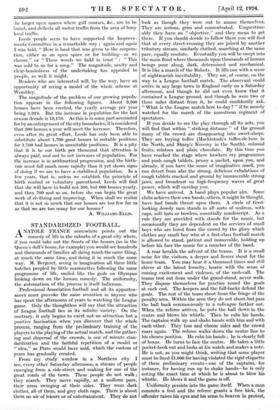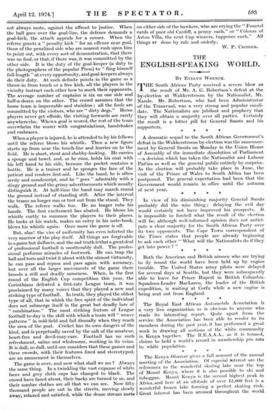STANDARDIZED FOOTBALL.
ANATOLE FRANCE somewhere points out the -CX- comedy of life in the suburbs of a great city where, if you could take out the fronts of the houses (as in the Queen's doll's house, for example) you would see hundreds and thousands of families all doing much the same thing, at much the same time, and doing it in much the same way. M. Bergeret, seeing in imagination all these little hutches peopled by little marionettes following the same programme of life, smiled like the gods on Olympus looking down 'on the human comedy. The uniformity, the automatism of the process is itself ludicrous.
Professional Association football and all its appurten- ances must provoke the same sensation in anyone who has spent the afternoons of years in watching the League game. Only the thoughtless will say that the attraction of League 'football lies in its infinite variety. On the contrary, it only begins to exert not an attraction but a positive fascination when you discover that the whole
process, ranging from the preliminary training of the
players to the playing of the actual 'match, and the gather- ing and dispersal of the crowds,' is one of minute stan- dardization and the faithful repetition of a model or " idea," as Plato would have said, which the custom of years has gradually created.
From my study window in a Northern city I see, every other Saturday afternoon, a stream of people emerging from a side-street and making for one of the great roads of the town. These people do not walk ; they march: They move rapidly, at a uniform pace, their arms swinging at their sides. They wear dark clothes, all of them, and grey cloth caps. There is about them no air of leisure or of entertainment. They do not look as though they were out to amuse themselves. They are serious, grim and concentrated. Unquestion- ably they have an " objective," and they mean to get there. If you should decide to follow them you will find that, at every street-crossing they are joined by another tributary stream,' similarly clothed, marching at the same pace, equally resolute. EVentually you will be swept into the main flood where thousands upon thousands of human beings pour along, dark, determined and mechanical.
It is like a march of the Robots. It fills one with a sense of nightmarish inevitability. They are, of course, on the way to a League football match. The observant could arrive in any large town in England early on a Saturday afternoon, and though he did not even know that it contained a League ground, and though he were two or three miles distant from it, he could confidently ask, " What is the League match here to-day? " if he merely. watched for the march of the monstrous regiment of spectators.
If you decide to see the play through all its acts, you will find that within " striking distance " of the ground many of the crowd are disappearing into sweet-shops. They are buying toffee (Mackintosh's toffee-de-luxe in the North, and Sharp's Kreemy in the South), colonial fruits, mintoes and plain chocolate. By this time you have reached the stage where hawkers cry programmes and push cough tablets, penny a packet, upon you, and already, if you have the sense of imaginative smell, you can detect from afar the strong, delicious exhalations of cough tablets cracked and ground by innumerable strong jaws, and broadcast on high-frequency waves of great power, which will envelop you.
We have arrived. A band plays popular airs. Some clubs achieve their own bands, others, it might be thought, have had bands thrust upon them. A circle of tired- looking dowdy men stands in all sorts of undress, with caps, soft hats or bowlers, essentially nondescript. As a rule they are provided with stands' for the music, but occasionally they are dependent on the services of small boys who are lured from the crowd by the glory which clothes any small boy who at a first-class football match is allowed to stand, patient and immovable, holding up before his face the music for a member of the band.
A roar heralds the advent of the teams. It is a small noise for the visitors, a deeper and fiercer shout for the home team. You may hear it 'a thousand times and still shiver at the latent ferocity, hoarse with the sense of coming excitement and violence, of the mob-call. The teams trot out from under the grand-stand, never walk. They dispose themselves 'for practice round the goals at each end. The keepers and the full-backs defend the goals. The rest of the team shoot from the fringe of the penalty area. Within the area they do not shoot, but pass the ball back ceremoniously to a colleague farther out. When the referee arrives, he puts the ball down in the centre and blows his whistle. Then he rubs his hands. The captains walk up and shake hands with him and with each other. They toss and choose sides and the crowd roars again. The referee walks down the centre line to his chosen position. He rubs his hands ; he is clearly full of beans. He turns to face the centre. He takes a little pocket-bdok out and looks at his watch and makes a note. He is not, as you might think, writing that some player must be fined £1,000 for having violated the rigid etiquette of these preliminary eventS—one of the captains, for instance, for having run up to shake hands—he is only noting the exact time at which he is about to blow his whistle. He blows it and the game is off.
Uniformity persists into the game itself. When a man commits a foul and the referee grants a free kick, the Offender raises his eyes and his arms to-heaven in protest, not always mute, against the affront to justice. When the ball goes over the goal-line, the defence demands a goal-kick, the attack appeals for a corner. When the referee grants a " penalty kick " for an offence near goal, those of the penalized side who are nearest rush upon him to point out, with every sort of demonstration, that there was no foul, or that, if there was, it was committed by the other side. It is the duty of the goal-keeper (a duty to the photographers of the popular Press) to " fling himself full-length " at every opportunity, and goal-keepers always do their duty. At such definite points in the game as a throw-in from touch or a free kick, all the players in the vicinity instruct each other how to mark their opponents. The average number of captains is six on one side and half-a-dozen on the other. The crowd assumes that the home team is impeccable and stainless ; all the fouls are committed by the visitors, who are " dirty dogs." Home players never get offside, the visiting forwards are rarely anywhere else. When a goal is scored, the rest of the team overwhelm the scorer with congratulations, handshakes and embraces.
When a player is injured, he is attended to by his fellows until the referee blows his whistle. Then a new figure starts up from near the touch-line and hurries on to the field. He is short, stout and shabby-looking. He carries a sponge and towel, and, as he runs, holds his coat with his left hand to his side, because the pocket contains a bottle. He is a trainer and he sponges the face of the patient and renders first-aid. Like the band, he is often seedy and nondescript, and he " goes " admirably with a dingy ground and the grimy advertisements which usually distinguish it. At half-time the band may march round the ground instead of standing still. After the interval the teams no longer run or trot out from the stand. They walk. The referee walks too. He no longer 'rubs his hands.. The first excitement has abated. He blows his whistle curtly to summon the players to their places. He looks at his watch, makes an entry in his note-book, blows his whistle again. Once more the game is off.
But, alas! the vice of uniformity has even infected the very marrow of the play itself. All things are forgivable in a game but dullness, and the sad truth is that a great deal of professional football is unutterably dull. The profes- sional performs miracles of footwork. He can trap the ball and turn and twist it about with the utmost virtuosity, he can pass and repass and pass again with accuracy, but over all the larger movements of the game there broods a still and deadly sameness. When, in the first round of the English Cup competition this year, the Corinthians defeated a first-rate League team, it was proclaimed by many voices that they played a new and striking type of football. In truth, they played the oldest type of all, that in which the free spirit of the individual does not submerge itself in the great but deadly lure of " combination." The most striking feature of League football to-day is the skill with which a team will " weave patterns " in mid-field and fail dismally when they reach the area of the goal. Cricket has its own dangers of the kind, and is perpetually saved by the salt of the amateur, heart-free and devil-may-care. Football has no such refreshment, saline and wholesome, working in its veins. It is dull, so dull, until one considers that these games and these crowds, with their features fixed and stereotyped, are an amusement in themselves.
The game is over, and now what shall we ,see ? Always the same thing. In ,a twinkling the vast expanse of white faces and grey cloth caps has changed to black. The crowd have faced about, their backs are turned to us, and their sombre clothes are all that we can see. Now fifty thousand people are out in the streets, moving slowly away, relaxed and satisfied, while the dense stream parts on either side of the hawkers, who are crying the " Funeral cards of poor old Cardiff, a penny each," or " Colours of Aston Villa, the next Cup winners, tuppence each." All things ar done by rule and orderly.
W. P. CROZIER.











































 Previous page
Previous page